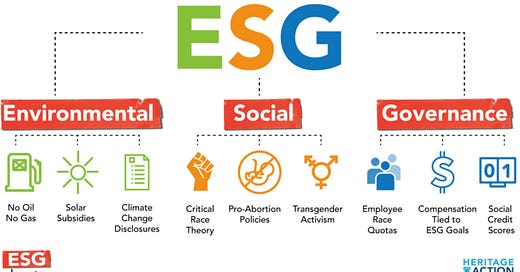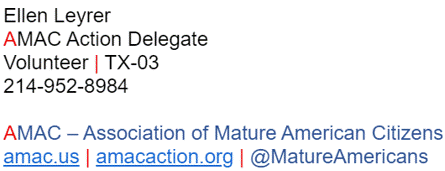I bet you’ve heard about ESG, the Environmental, Social, and Governance scheme to push people where bureaucracy wants them to go.
When individual sovereignty (the moral or natural right of a person to have bodily integrity and be the exclusive controller of one's own body and life) is being battered, life as we Americans know it is on the line.
ESG legislation continues to grow; companies and individuals have already been harmed by ESG.
This newsletter has several links for additional information, and there is a ton of information on the web. I always recommend you do your own research and make up your own mind. Trust, but verify is good advice.
This one-minute video, ESG Hurts, shows an example of how these woke factors are applied.
This Forbes article is a blog written (Nov 10, 2016) ahead of the WEF Annual Meeting of Global Future Councils, by Ida Auken, a WEF Young Global Leader and Member of Global Future Council on Cities and Urbanization, Welcome To 2030: I Own Nothing, Have No Privacy And Life Has Never Been Better. The website of the World Economic Forum is weforum.org, and you can watch their video, 8 Predictions for the World in 2030.
Your AMAC Newsletter (email dated 8/15/2022) had this to say:
Environmental, Social, and Governance (ESG) criteria are used to screen investments based on corporate policies and to encourage companies to act responsibly. Essentially, they are non-financial criteria that investors use to evaluate a company's sustainability. It all sounds reasonable enough. After all, no one wants another Enron, and transparency and more complete information are always good, right? Maybe. A closer look, though, sure makes the ESG trend smack of "wokeness." Consider this table posted on nerdwallet.com:
Environmental
• Carbon emissions
• Air and water pollution
• Deforestation
• Green energy initiatives
• Waste management
• Water Usage
Social
• Employee gender and diversity
• Data security
• Customer satisfaction
• Company sexual harassment policies
• Human rights at home and abroad
• Fair labor practices
Governance
• Diversity of board members
• Political contributions
• Executive pay
• Large-scale lawsuits
• Internal corruption
• LobbyingFlorida Governor Ron DeSantis is proposing legislation for his state's 2023 legislative session to target ESG standards. The bill will "prohibit big banks, credit card companies, and money transmitters from discriminating against customers for their religious, political, or social beliefs." It would also prohibit Florida's State Board of Administration (SBA), which is responsible for managing and investing the assets of the state's retirement system and other funds, from considering ESG factors and mandate that fund managers "only consider maximizing the return on investment on behalf of Florida's retirees."
Justin Haskins of Fox Business writes that "ESG scores turn market economics on its head" and are a "kind of social credit scoring system that is now widely being used by woke corporations and Wall Street investors to promote the Biden administration's far-left agenda, all without having to pass a law through Congress or a state legislature." Read more in his article on the topic here.
Digital currency is one of the tenets of proponents of ESG which ties back to World Economic Forum (an international group of elites) and to big government. Direct from the U.S. Federal Reserve, Money and Payments: The U.S. Dollar in the Age of Digital Transformation. And here’s the 40-page Research and Analysis document.
Digital currency is not a good thing. Global anything is not good - except world peace. Digital currency is an end to privacy. If widely used, it would give the central bank unprecedented power over the financial system. And it’s a big step to total government control, whether national or global. Digital currencies come with serious risks. Without [complicated and complex] additional privacy measures, central bankers shouldn’t establish them.
Governments have strong incentives to simplify society for the purpose of social control. Bringing commerce within a centrally managed payment system is a textbook example. Without additional safeguards, virtually all transactions would be a matter of public record. Financial privacy would be difficult to maintain. Also, the Fed could place conditions on its use to nudge users in desired directions. This is almost exactly what the Chinese Communist Party has done to its citizens with their Social Credit Score. To see how it works, watch this 6-minute video, China’s Social Credit System.
Environmental, social, and governance (ESG) metrics are a social credit system designed to coerce businesses - and, by extension, individuals, and all of society - to transform their practices.
Through a carrot-and-stick approach, investors and banks (and soon governments) use ESG to push businesses to change how they function, regardless of what the employees and customers of those businesses want. In many cases, however, corporate executives are all too willing to go along, because they want access to the cheap capital offered by investors and financial institutions. And they don’t want to be cancelled.
The widespread adoption of ESG metrics - which is also commonly called “stakeholder capitalism” - is meant to radically alter how businesses are evaluated, expanding considerations beyond traditional and common-sense economic metrics like profit, revenue, debt, customer satisfaction, and product development.
Instead of looking at economic and financial considerations, ESG social credit metrics measure things like, “Percentage of active workforce covered under collective bargaining agreements” (union labor), and “Percentage of employees per employee category, by age group, gender, and other indicators of diversity (e.g. ethnicity).”
Environmental, Social, and Governance is a Wolf in Sheep's Clothing - ESG seems like a positive way to protect the environment on a surface level, but a deeper examination reveals a more sinister path to totalitarianism.
The Environmental, Social, And Governance Threat is real. Big business, government, progressives, and elites have a vested interest in continuing to push ESG restrictions. That gives them the advantages of taking the little guy’s toys and being in control.
What happens in other countries is coming to America. A Social Credit System Arrives in Canada - Justin Trudeau just created a caste of economic untouchables. Can we stop this dystopian policy from taking hold in America?
In a recent episode of Bloomberg's Odd Lots Podcast, Goldman Sachs' top commodities strategist describes ESG investing as "a blunt instrument that is reducing capital flows into a very critical sector." It is, in other words, what happens when cancel culture meets investing.
ESG is infecting every level of government and finance: last May, Biden’s pick to lead banking regulation said, “the way we basically get rid of those carbon financiers is we starve them of their sources of capital." This is the heart of ESG - financially starving any companies who aren't in line with the progressive ideology.
More resources:
World Economic Forum was created by US policies
Criminal Collusion on Wall Street Through ESG Investing?
Make your voice heard by signing your name now.
Here are some current articles on environment from Heritage.org.
If this email was forwarded to you, please subscribe for free to receive new posts.
Until next time,
Thanks again for reading! I’m glad you’re here!
Comments are welcome and may be shared in future newsletters.
You can always see everything on the website, leyrer.substack.com.
Some housekeeping…
Going forward, you may need to check your spam folder. And please mark this address as ‘not spam.’ If the newsletter isn’t in your spam folder either, you should look in the Promotions tab.








